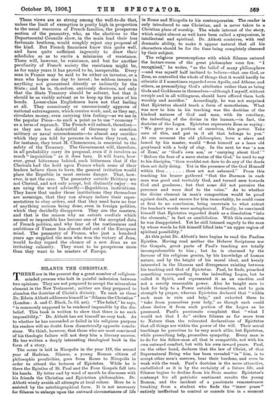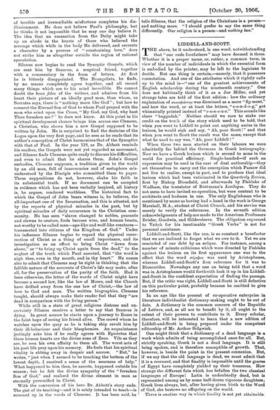SILANUS THE CHRISTIAN.
The scene is laid in Nicopolis in the year 118, the second year of Hadrian. Silanus, a young Roman citizen of philosophic proclivities, goes from Rome to Nicopolis in order to attend the lectures of Epictetus. While he is there the Epistles of St. Paul and the Four Gospels fall into his hands. By letter and by word of mouth he discusses with his friends the Christian and Epictetian philosophies. Dr. Abbott wisely avoids all attempts at local colour. Here he is assisted by the autobiographical form. It is not necessary for Silanus to enlarge upon the outward circumstances of life
in Rome and Nicopolis to his contemporaries. The reader is only introduced to one Christian, and is never taken to a Christian place of worship. The whole interest of the story, which might almost as well have been called a symposium, is intellectual and spiritual. Dr. Abbott contrives, with real dramatic ability, to make it appear natural that all his characters should be for the time being completely obsessed by their subject.
The religious preconceptions with which Silanus entered the lecture-room of the great philosopher were few. "I recognised," he writes, "as the belief of many philosophers —and was myself half inclined to believe—that one God, or Zeus, so controlled the whole of things that it would hardly be atheistic if I sometimes regarded even Apollo, and Athene, and others, as personifying God's attributes rather than as being Gods and Goddesses in themselves—although I myself, without scruple and in all willingness, should have offered them both worship and sacrifice." ACcordingly, he was not surprised that Epictetus should teach a form of monotheism. What was new to him in his teaching was the doctrine of the kindred natures of God and man, with its corollary, the indwelling of the divine in the human,—in fact, the doctrine of the Logos. Epictetus represents Zeus as saying : "We gave you a portion of ourselves, this power. Take care of this, and put in it all that belongs to you." At one moment the old philosopher, born a slave and lamed by his master, would "flout himself as a lame old greybeard with a body of clay. In the next he was ' a son of Zeus,' or God's own son,' or carrying about God.'" "Before the face of a mere statue of the God," be used to say to his disciples, "thou wouldst not dare to do any of the deeds thou art daily doing. Yet in the presence of the God Himself
within thee thou art not ashamed." From this teaching his hearer gathered "that the Daemon in each man was good and veritably God, and turned men towards God and goodness ; but that some did not perceive the presence and were deaf to the voice." As to whether the divine element in man's composition would be proof against death, and ensure for him immortality, he could come at first to no conclusion, being uncertain to what extent the teacher's words were metaphorical. Finally, he convinced himself that Epictetus regarded death as a dissolution "into the elements," in fact as annihilation. With this conclusion he was disappointed. Yet he still listened eagerly to the man by whose words he felt himself lifted into "an upper region of spiritual possibility."
At this point Dr. Abbott's hero begins to read the Pauline Epistles. Having read neither the Hebrew Scriptures nor the Gospels, great parts of Paul's teaching are totally incomprehensible to him ; but he is charmed by the fervour of his religious genius, by his knowledge of human nature, and by the height of his moral ideal, and keenly interested in the likeness and divergences existing between his teaching and that of Epictetus. Paul, he finds, preached something corresponding to the indwelling Logos, but he called it Spirit, and represented it as an emotion and not a merely reasonable power. Also he taught men to look for help to a Power outside themselves, and to gain strength by prayer, whereas Epictetus declared that "within each man is ruin and help," and exhorted them to "take from yourselves your help," as though each could alone derive it from such portion of the Logos as he possessed. Paul's passionate complaint that "what I would not that I do" strikes Silanus as far more true to Nature than the reiterated declarations of Epictetus that all things are within the power of the will. Their moral teachings he perceives to be very much alike, but Epictetus, while prescribing help, proscribes sympathy. Every man is to do for his fellow-man all that is compatible, not with his own outward comfort, but with his own inward peace. Paul, on the other band, declares that the law of Christ, of that Supernatural Being who has been revealed " in " him, is to accept other men's sorrows, bear their burdens, and even be weak with the weak. Paul's doctrine is the more attractive, embellished as it is by the certainty of a future life, and Silanus begins to decline from his Stoic master. Epictetua's contempt for all patriotic sentiment revolts the young Roman, and the incident of a passionate remonstrance breaking from a student who finds the "inner peace" entirely ineffectual to control or console him in a moment of terrible and irremediable misfortune completes his die- illusionment. He does not believe Paul's philosophy, but be thinks it not impossible that he may one day believe it. The idea that an emanation from the Deity might take up an abode in the hearts of those who believed the message which while in the body He delivered, and recreate a character by a process of "constraining love," does not strike him as altogether outside the region of rational speculation.
Silanus now begins to read the Synoptic Gospels, which are sent him by Scaurus, a sceptical friend, together with a commentary in the form of letters. At first he is bitterly disappointed. The Evangelists, be finds, by no means completely agree together, and all record many things which are to his mind incredible. He cannot doubt the bona fides of the writers, and admires from his heart their picture of an ideally good man, than whom, as Socrates says, there is "nothing more like God" ; but how to connect the Eternal Son of God to whom Paul prayed with the man who cried upon the Cross, "My God, my God, why bast Thou forsaken me ?" he does not know. At this point in his spiritual development chance brings him across one Clemens, a Christian, who shows him a new Gospel supposed to be written by John. He is surprised to find the doctrine of the Logos upon the very first page, and he sees as he reads that its author's conception of Christ harmonises that of the Synoptics with that of Paul. In the year 118, as Dr. Abbott reminds his readers, the Gospels were not yet regarded as sacrosanct, and Silanus finds Clemens quite ready to discuss his difficulties, and even to admit that he shares them. John's Gospel embodies, Clemens supposes, a tradition given to the world by an old man, full of inaccuracies and of metaphors mis- understood by the Disciple who committed them to paper. These suppositions do not, however, shake his faith in its substantial truth. If no document can be accepted in evidence which has not been verbally inspired, all history is, he argues, rendered worthless. The historical fact to which the Gospel of John bears witness is, he believes, the all-important one of the Incarnation, and this is attested, not by the reports of physical miracles in the past, but by spiritual miracles of daily occurrence in the Christian com- munity. He has seen "slaves changed to nobles, peasants and clowns to orators, fools become wise, and human beasts, not worthy to be called men—ape-like and wolf-like creatures— transmuted into citizens of the Kingdom of. God." Under his influence Silanus begins to regard the physical resur- rection of Christ as a thing of small importance, and its investigation as an effort to bring Christ "down from above," or "to bring up Christ again from the dead," to the neglect of the truth which Paul asserted, that "the word is nigh thee, even in thy mouth, and in thy heart." He comes also to admit that Clemens may be right in thinking that the fallible nature of the accounts of Christ's life may make, after all, for the preservation of the purity of the faith. Had it been otherwise, the letter of the words of Christ might have become a second law, like the law of Moses, and the Church have drifted away from the •one law of Christ, —the law of love to God and man. The written biographies, Clemens taught, should always make their reader feel that they "are dead in comparison with the living person."
While still in a state of great religious distress and un- certainty Silanus receives a letter to say that Scaurus is dying. In great sorrow he starts upon a journey to Rome in the faint hope of seeing his friend alive. The crowd whom he watches upon the quay as be is taking ship revolt him by their ill-behaviour and their blasphemies. An acquaintance jestingly asks him if he really agrees with Epictetus that these human hearts are the divine sons of Zeus. Vile as they are, he sees his own affinity to them all. The worst acts of his past life prey upon his memory. He feels that his spiritual vitality is ebbing away in despair and sorrow. "But," he
writes, "just when I seemed to be touching the bottom of the lowest depth, I received a sense of the nearness of help." What happened to him then, be asserts, happened outside his reason ; but he felt the divine sympathy of the "forsaken
Son of God," and realised the divine element in man as eternally personified in Christ.
With the conversion of his hero Dr. Abbott's story ends. The gist of its teaching—and it is solely intended to teach—is summed up in the words of Clemens. It has been said, he
tells Silanus, that the religion of the Christians is a person— and nothing more. "I should prefer to say the same thing differently. Our religion is a person—and nothing less."















































 Previous page
Previous page